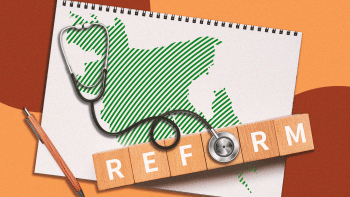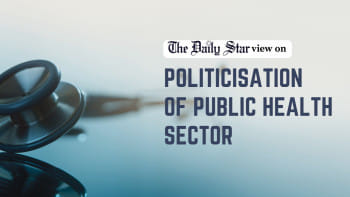SWAp’s effectiveness for Bangladesh’s health sector

UHC Forum is a coalition of health sector practitioners, advocates and academics dedicated to a strategic push on the universal health coverage (UHC) agenda. UHC Forum Health Debates is one of its flagship activities carried out in partnership with the Power and Participation Research Centre (PPRC). This op-ed is derived from the health debate on the Sector Wide Approach (SWAp) modality adopted for health sector planning and implementation since 1998.
The Sector-Wide Approach (SWAp), introduced in Bangladesh in the late 1990s, sought to improve the health sector by uniting the efforts of government, donors, and NGOs under a unified national plan. The strategy proved effective in several areas—enhancing coordination, reducing duplication and ensuring more efficient use of resources. It fostered a government-led approach, empowering the Ministry of Health and Family Welfare (MOHFW) to take ownership of health programmes and make decisions that align with national priorities. The pooling of funds from various donors simplified financial management and allowed for a more harmonised implementation of health services. Moreover, SWAp contributed to capacity building by strengthening institutional frameworks, enhancing local expertise, and promoting evidence-based policymaking. However, SWAp also faced substantial challenges. Key stakeholders, such as the private sector and the Ministry of Local Government, Rural Development and Co-operatives, were excluded from planning processes, limiting its scope and effectiveness. Centralised decision-making created bureaucratic delays, slowing programme implementation. Additionally, larger donors, such as the World Bank, exerted disproportionate influence, at times, prioritising global agendas over local needs. The risk of mismanagement also grew as pooled funding lacked adequate oversight and accountability mechanisms.
To address these shortcomings, I advocate transitioning to a new model, termed Sector-Wide Inclusive Planning and Evaluation (SWIPE) to integrate private sector actors, and decentralised planning and budgeting to the district level.
-----Dr Abu Jamil Faisel is a public health expert.
There is an urgent need for a comprehensive overhaul of Bangladesh's health system. The existing dual-budget structure, which separates operating and development budgets, lacks coherence and prevents effective symbiosis between routine operational costs (staff salaries, fuel and utilities, repair and maintenance, travel, etc), and development costs for new infrastructure development and health service improvements.
The Health Population and Nutrition Sector Program (HPNSP) under SWAp brought advantages such as faster decision-making, delegation of authority to health managers, health workforce capacity building, improved coordination, monitoring and supervision. However, critical issues remain unresolved. Universal health coverage, elimination of healthcare discrimination, substantial improvements in healthcare quality, avoidance of verticalisation in healthcare delivery, and the reduction of out-of-pocket expenses continue to elude the system.
The fragmented and verticalised delivery of healthcare services limits integration and patient-centred care. Bangladesh's age-old health systems have many inherent defects. The HPNSP or any similar prescription will not remedy it. Bangladesh urgently needs a serious and massive overhaul of its health systems in overall structure and processes to enable it effectively meeting the population's health needs through integrated primary healthcare, sustainable universal health coverage, health sustainable development goals (SDGs), and client satisfaction.
----Professor Dr Abul Kalam Azad is former director general of health services.
Exploring alternatives to SWAp in Bangladesh's health sector is a pressing discussion, given the challenges faced in achieving sustainable programme outcomes. One of the critical considerations is whether it is time to pivot back to the original revenue-based system or implement a hybrid model that leverages the strengths of both approaches. The revenue-based system, rooted in direct budget allocations, could potentially offer more flexibility and control for domestic health programme funding. Ensuring financial sustainability remains a key focus as stakeholders debate these alternatives. The path forward must address how Bangladesh can maintain or enhance programme effectiveness without depending heavily on SWAp, which, while comprehensive, often leads to dependency on external funding and complex coordination issues.
A well-articulated roadmap is essential for transitioning from SWAp to a new or modified system that prioritises local ownership and resilience. The government must lead with robust policy frameworks, while development partners can assist with technical expertise, transitional funding and access to global best practices.
-----Dr Md Aminul Hasan is a health system expert.
SWAp has played a pivotal role in shaping Bangladesh's health sector, improving coordination, ownership, and resource management. However, its limitations, including rigidity, donor dependency, and exclusion of key stakeholders, necessitate a reimagined approach.
Hybrid models, public-private partnerships, national health insurance schemes, and decentralised planning offer pathways to address these challenges. As Bangladesh works toward achieving universal health coverage and the health-related Sustainable Development Goals by 2030, a collaborative, inclusive, and forward-looking strategy will be essential.
Health system reform requires technical solutions, strong political will, and a commitment to equity and sustainability. While reform is essential, political will and strategic intent are critical in driving meaningful health sector reform. Bangladesh's health system requires a clear focus on necessary and actionable reforms. The challenge lies in crafting precise recommendations and mobilising the political leadership needed to implement them effectively. Without sharp, actionable strategies, opportunities for impactful reform may be missed. It is essential to foster collaborative efforts across stakeholders to address systemic gaps and meet the health aspirations of the population.
-----Hossain Zillur Rahman is executive chairman of Power and Participation Research Centre (PPRC) and convener of universal health coverage (UHC) Forum.
Views expressed in this article are the authors' own.
Follow The Daily Star Opinion on Facebook for the latest opinions, commentaries and analyses by experts and professionals. To contribute your article or letter to The Daily Star Opinion, see our guidelines for submission.

 For all latest news, follow The Daily Star's Google News channel.
For all latest news, follow The Daily Star's Google News channel. 










Comments